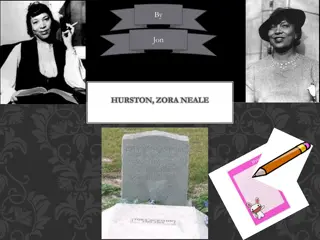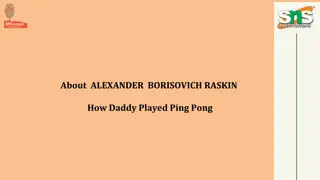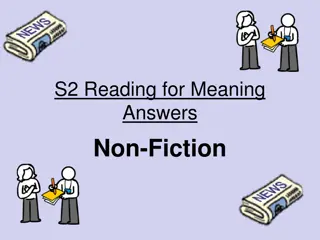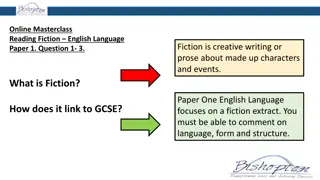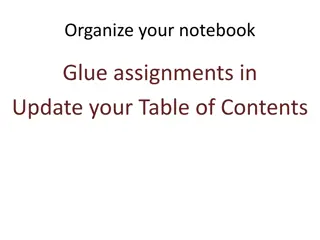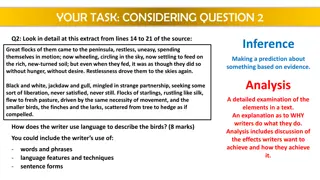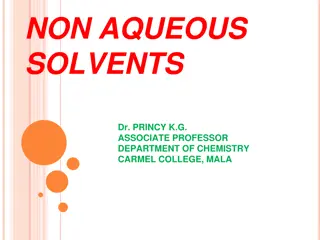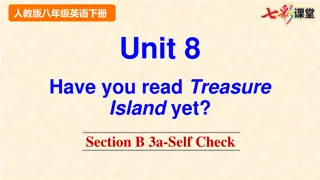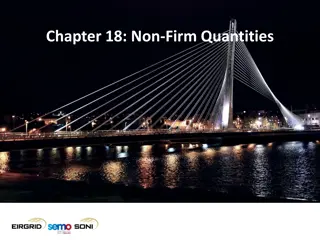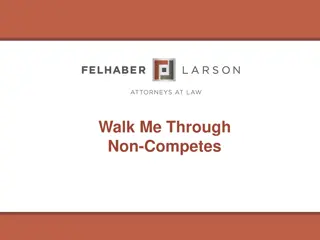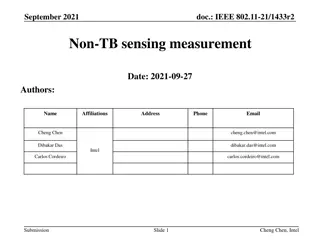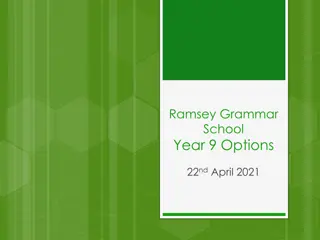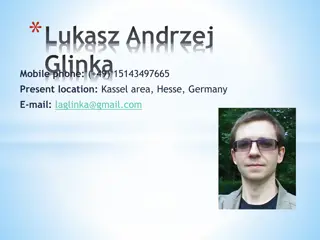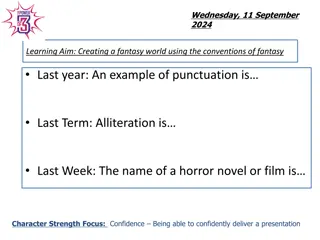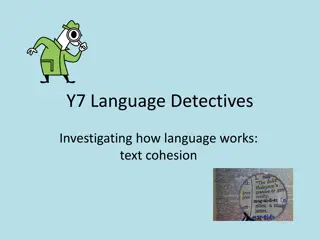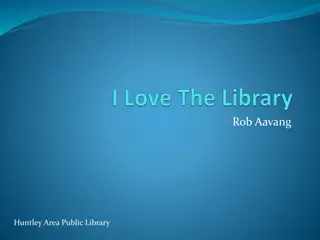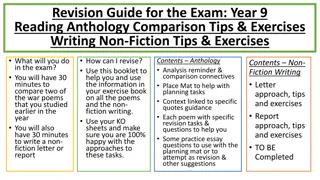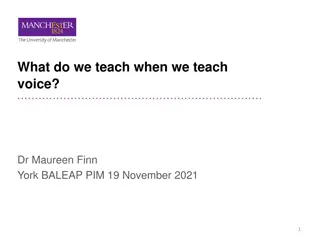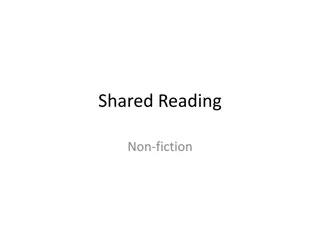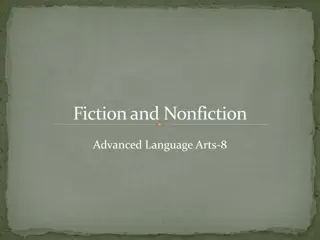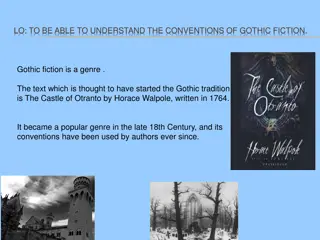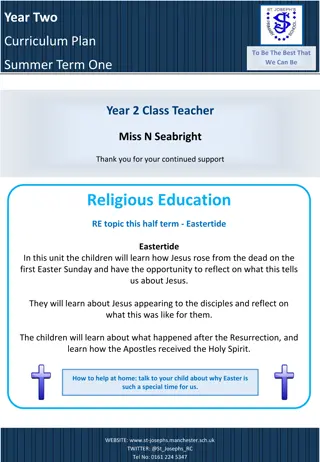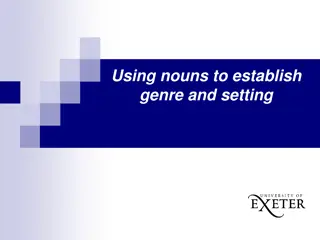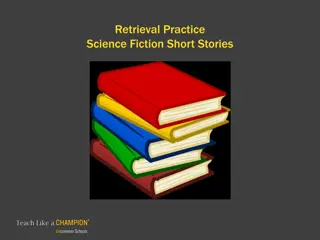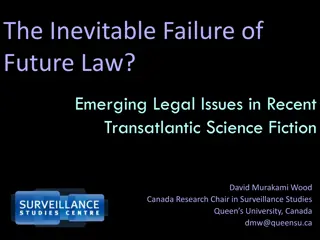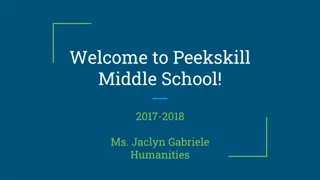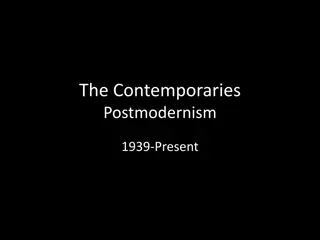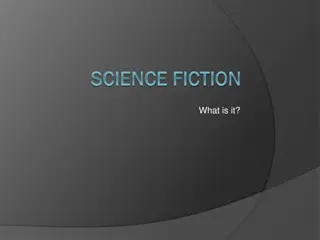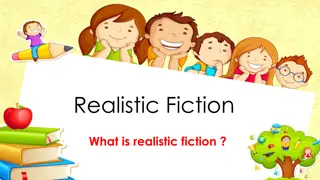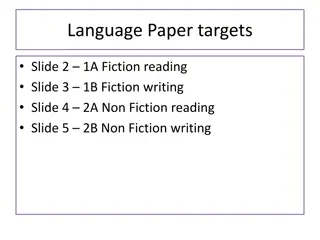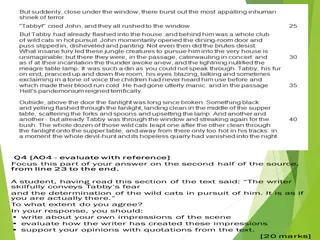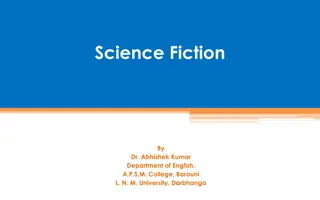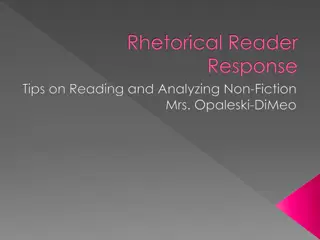Exploring Citizen Journalism and Non-Fiction Writing
Explore the world of citizen journalism and non-fiction writing, learning about text types, adapting writing to conventions, considering audience, purpose, and tone. Discover the significance and usefulness of non-fiction writing, and delve into creating various text types. Uncover the role of citiz
1 views • 11 slides
Zora Neale Hurston: African-American Writer of the Harlem Renaissance
Zora Neale Hurston, born in Notasulga, Alabama, in 1891, was a prominent African-American writer known for her works reflecting the African-American culture and folklore. Growing up in Eatonville, Florida, and later studying at Barnard College, she stood out among her contemporaries for her portraya
2 views • 4 slides
The Automation Paradox
Exploring the concept of the automation paradox, this analysis delves into the writer's claim about automation as a paradox and how it relates to the results of software and McKinsey & Company studies. The information in graphs and the writer's use of transitions are evaluated, highlighting the need
0 views • 12 slides
Insight into Alexander Borisovich Raskin: Writer, Poet, and Ping Pong Enthusiast
Russian writer and poet Alexander Borisovich Raskin, known for his humorous and satirical works, became famous for his book "When Daddy was a Little Boy." The story "How Daddy Played Ping Pong" showcases his talent and wit. Learn about his life, literary contributions, and why table tennis is called
1 views • 8 slides
Ernest Hemingway: Iconic Writer of the Lost Generation
Ernest Miller Hemingway, born in Oak Park, Illinois, was a prominent writer of the Lost Generation. His experiences in World War I influenced his writing style, marked by simplicity and objectivity. Moving to Paris, he mingled with Modernist artists and revolutionized American fiction. The Lost Gene
3 views • 24 slides
Exploring Contemporary Non-Fiction Themes
Delve into diverse non-fiction topics such as pet pampering, societal contradictions in teen reading habits, environmental concerns like plastic pollution, and societal opinions on education and lifestyle choices. Discover intriguing discussions and thought-provoking insights in this engaging collec
0 views • 55 slides
Understanding Fiction Through Text Analysis: Paper 1 English Language Masterclass
Delve into the world of fiction through an analysis of the novel "Girl With a Pearl Earring". Explore how language, form, and structure are used in the extract to captivate readers. Discover the characters, setting, and narrative techniques employed by the writer to engage and intrigue readers. Unco
2 views • 7 slides
Exploring Historical Fiction: Elements and Examples
Discover the essence of historical fiction, its key elements, and examples like "Forrest Gump." Learn how plausibility and interpretation play pivotal roles in creating captivating narratives that blend fiction with historical events.
0 views • 11 slides
Analyzing Language in Describing Birds
Delve into the writer's use of language in vividly describing the behaviors of different bird species in the given extract. Explore how words, phrases, and language techniques are employed to depict the restlessness, movement, and interactions among the birds, creating a dynamic and engaging portray
0 views • 22 slides
Understanding Non-Aqueous Solvents: Types and Classification
Inorganic non-aqueous solvents play a crucial role in chemical research and industry. This article by Dr. Princy K.G. delves into the classification of solvents based on protonicity, polarity, and aqueous vs. non-aqueous nature. It explores the types of non-aqueous solvents, such as protonic and non
1 views • 29 slides
Exploring Unit 8: Writing an Article About a Singer or Writer
Dive into the activities of Unit 8, where you'll review the present perfect tense, learn to write an article about a singer or writer, and fill in blanks according to a sample article. Think about a well-known singer or writer, make a list of facts, and write an article using provided words and phra
0 views • 23 slides
Understanding Non-Firm Quantities in Electricity Markets
Non-Firm Quantities in electricity markets involve units with non-firm access not being compensated for their non-firm capacity not getting accommodated on the system. The concept of Firm Access Quantity plays a key role in determining compensation levels for units, with differences in implementatio
0 views • 6 slides
Understanding Non-Compete Agreements: Enforceability and Requirements
Non-compete agreements are commonly used in the United States to protect businesses from competition by former employees. To be enforceable, these agreements must meet certain requirements, including independent consideration, protection of legitimate business interests, and reasonableness in scope,
0 views • 26 slides
Comparison of Trigger-based vs. Non-Trigger-based Sensing Measurement in IEEE 802.11
The document discusses the differences between Trigger-based (TB) and Non-Trigger-based (Non-TB) sensing measurement instances in IEEE 802.11 standards, focusing on who initiates the sensing measurement. TB sensing is initiated by the AP, while Non-TB sensing is initiated by a non-AP STA, enabling o
6 views • 13 slides
English Language Cambridge IGCSE Course Overview
Students of the Ramsey Grammar School Year 9 English Language Cambridge IGCSE course will engage in reading and analyzing various fiction and non-fiction texts, honing comprehension skills, crafting written pieces with clarity and purpose, and enhancing their ability to summarize and re-imagine cont
1 views • 7 slides
Lukasz Andrzej Glinka - Non-fiction Writer and Science Author with a Diverse Academic Background
Lukasz Andrzej Glinka is a prolific non-fiction writer and science author known for his extensive publication record, academic achievements, and editorial contributions. With a background in theoretical physics and a wealth of experience at prestigious research institutions worldwide, he has establi
0 views • 6 slides
Ernest Hemingway: A Brief Overview of His Life and Works
Ernest Miller Hemingway, born on July 21, 1899, was a renowned American novelist, short story writer, and journalist who left a significant mark on 20th-century fiction. Hemingway's distinct writing style and adventurous life influenced many generations. He produced numerous iconic works, including
0 views • 20 slides
Exploring Fantasy Worlds: Conventions, Types, and Challenges
Dive into the realm of fantasy literature and learn about the conventions, types, and differences between fantasy and sci-fi. Uncover the definition of fantasy, explore popular genres, and discover sub-genres like fiction, science fiction, and historical fiction. Engage in thought-provoking challeng
0 views • 17 slides
Washington Irving: Father of American Fiction and Pioneer of American Romanticism
Washington Irving, an influential American author of the early 19th century, is revered as the Father of American fiction. Known for iconic works like "The Legend of Sleepy Hollow" and "Rip Van Winkle," Irving played a crucial role in establishing American literature as an independent art form. His
1 views • 14 slides
Understanding Text Cohesion in Non-Fiction Writing
Exploring text cohesion in non-fiction writing by analyzing how ideas are linked and sequenced clearly using key linguistic elements like nouns, pronouns, determiners, and verbs. The importance of maintaining coherence for readers to easily follow the text is highlighted through examples and explana
0 views • 8 slides
Rob Aavang Huntley Area Public Library Review and Rating
Reasons to love the library include books, movies, online resources, great staff, and computer classes. The individual expresses their feelings at the library and how they feel when leaving. They typically check out non-fiction books, movies, and fiction. Two ratings are provided for customer servic
0 views • 8 slides
Year 9 Reading Exam Revision Guide: Anthology Comparison & Non-Fiction Writing Tips
This guide is for Year 9 students preparing for their reading exam, covering tips and exercises for comparing war poems and writing non-fiction letters/reports. It includes analysis reminders, comparison connectives, context guidance, specific revision tasks for each poem, and practice essay questio
0 views • 10 slides
Understanding Voice in Academic Writing: A Comprehensive Overview
Delve into the nuanced concept of voice in academic writing through a discussion of its definitions, classroom implications, evaluation aspects impacted by identities, and the importance of writer ownership. Explore the complex interplay of textual and non-textual elements shaping writer identity. C
0 views • 27 slides
Effective Strategies for Shared Reading in Non-Fiction Settings
Shared reading in non-fiction is an effective approach to reinforce literacy skills while teaching subject-specific content. Teachers choose texts that match students' reading levels, are cross-curricular, and engaging. Discussions, predictions, vocabulary exploration, and historical context are int
0 views • 22 slides
Understanding Fiction and Nonfiction in Language Arts
Fiction and nonfiction are two key genres in literature. Fiction involves imaginative storytelling with elements like plot, characters, setting, point of view, and theme. Nonfiction, on the other hand, deals with real people, events, and ideas, aiming to inform, persuade, or entertain readers. Explo
0 views • 14 slides
Crafting a Strong Thesis Statement for Literary Analysis
Crafting a strong thesis statement is crucial for any literary analysis. A thesis statement comprises the writer's purpose and subtopics, with the writer's purpose being the specific point needing argumentation. This summary guides you through understanding the writer's purpose, creating an effectiv
0 views • 16 slides
Doris Lessing: A Pioneering Writer and Feminist Icon
Doris Lessing, born in Persia and raised in Southern Africa, rose to prominence as a leading post-war English writer. Her work delves into diverse issues such as race, gender politics, and individuality in society. Lessing's novel "The Golden Notebook" solidified her association with the feminist mo
0 views • 45 slides
Understanding Gothic Fiction Conventions in Literature
Gothic fiction is a captivating genre rooted in dark, mysterious settings, supernatural elements, and eerie atmospheres. Originating with "The Castle of Otranto" by Horace Walpole, this genre has evolved to encompass elements like family curses, isolated castles, and sinister creatures. Dive into th
0 views • 25 slides
Year 2 Curriculum Plan for Summer Term - Be the Best That We Can Be
Year 2 Curriculum Plan for Summer Term involves various subjects and activities aimed at providing a well-rounded educational experience for the students. The plan includes topics such as Religious Education focusing on Eastertide, English writing featuring fiction and non-fiction texts, reading com
0 views • 4 slides
Creative Noun Usage in Science Fiction Writing
Explore the art of using nouns to establish genre, setting, and character names in science fiction writing. Learn how authors like Philip Reeve utilize proper nouns to create immersive worlds and unique characters. Delve into the significance of authentic text, discussion, and purposeful learning pr
0 views • 10 slides
Science Fiction Retrieval Practice: Short Stories Insights
Explore futuristic technologies, incongruity, and speculative fiction elements in science fiction short stories like "Robbie" and "There Will Come Soft Rains." Uncover the connections to historical events, like the Cold War, through literary analysis of these captivating narratives.
0 views • 16 slides
Exploring Legal Themes in Science Fiction: The Inevitable Failure of Future Law
This study delves into emerging legal issues in recent transatlantic science fiction works by authors like Charles Stross, Ken McLeod, and Paolo Bacigalupi. It examines the portrayal of law in SF and what insights it offers about our legal systems. Through a systematic survey of over 300 novels and
0 views • 12 slides
Peekskill Middle School Humanities Course Overview
Peekskill Middle School offers a comprehensive Humanities course for the 2017-2018 academic year, taught by Ms. Jaclyn Gabriele. The course covers various writing processes, character analysis, personal narratives, themes, partner reading, literary essays, non-fiction, Ancient Egypt, social issues,
0 views • 12 slides
Exploring Postmodernism: Literature, Poetry, and Nonfiction in the Contemporary Era
Delve into the Postmodern era from 1939 to the present, characterized by a blend of fiction and non-fiction, diverse narratives, and challenging traditional literary structures. Postmodern literature allows for multiple interpretations, blending different worlds and forms. Postmodern poetry, exempli
0 views • 9 slides
Exploring the World of Science Fiction
Science fiction is a genre that delves into imagined future scientific and technological advances, exploring major societal and environmental changes, space travel, time travel, and life on other planets. It combines elements of science and fiction to create believable yet captivating narratives tha
0 views • 14 slides
Understanding Realistic Fiction: Features and Examples
Realistic fiction is a genre of writing that portrays characters, settings, and events that could exist in real life, even though the story itself may be fictional. The key features include believable characters, realistic settings, everyday problems, and plausible solutions. By sorting book covers
0 views • 9 slides
Language Paper Targets for Fiction and Non-Fiction Reading and Writing
This content provides detailed targets for Language Papers, focusing on Fiction and Non-Fiction reading and writing skills. It covers strategies such as being specific in analysis, using evidence from texts, improving sentence structures, enhancing vocabulary usage, and applying language techniques
0 views • 14 slides
Analyzing the Writer's Vivid Depiction of Horror in the Second Half of the Text
In the second half of the text, the writer skillfully portrays a sense of horror that immerses the reader in the narrator's surroundings. The descriptive imagery creates a vivid and tangible experience, evoking a feeling of being present in the harrowing situation. This analysis explores the impact
0 views • 6 slides
Evolution of Science Fiction Literature
Science fiction genre, blending imaginative fantasy with scientific principles, has evolved significantly over time. Initially emerging in the late 1800s, it gained popularity alongside technological advancements. Theodore Sturgeon highlighted the essence of human stories within the genre. Iconic wo
0 views • 8 slides
Effective College Reading and Analysis Strategies for Non-Fiction Texts
Enhance your non-fiction reading and analysis skills with these practical tips: prepare yourself mentally before reading, preview the article, highlight key points while reading, monitor comprehension, and summarize the article afterward. Additionally, learn how to create a rhetorical précis to eff
0 views • 19 slides

